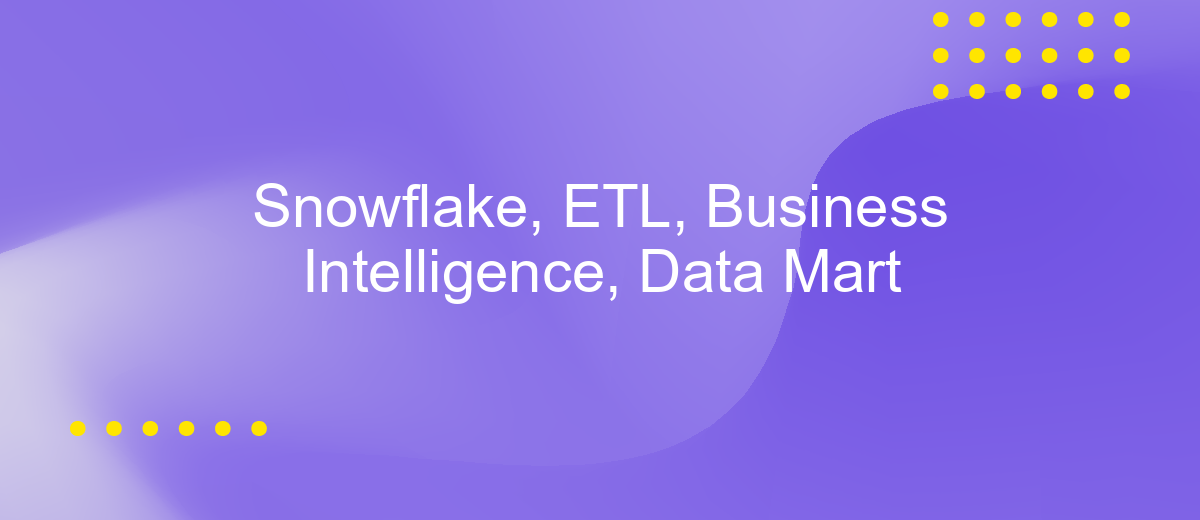Snowflake, ETL, Business Intelligence, Data Mart
In today's data-driven world, leveraging advanced technologies is crucial for business success. Snowflake, a powerful cloud-based data warehousing solution, combined with ETL (Extract, Transform, Load) processes, enhances Business Intelligence (BI) capabilities. This integration enables efficient data management and the creation of robust Data Marts, empowering organizations to make informed decisions and gain a competitive edge.
Introduction
In today's data-driven world, businesses are increasingly relying on robust data management and analytics platforms to gain insights and make informed decisions. Snowflake, a cloud-based data warehousing solution, has emerged as a leading platform for handling large volumes of data with efficiency and scalability. Integrating Snowflake with ETL (Extract, Transform, Load) processes and Business Intelligence (BI) tools can significantly enhance data accessibility and usability.
- Snowflake offers a highly scalable and flexible data warehousing solution.
- ETL processes are essential for transforming raw data into meaningful insights.
- Business Intelligence tools help visualize and analyze data for better decision-making.
- Data Marts provide specialized data storage for specific business needs.
Utilizing services like ApiX-Drive can simplify the integration process between Snowflake, ETL tools, and BI platforms, ensuring seamless data flow and real-time analytics. By leveraging these technologies, businesses can create a robust data ecosystem that supports strategic initiatives and drives growth.
Snowflake and its Role in ETL

Snowflake is a powerful data warehousing solution that plays a crucial role in the ETL (Extract, Transform, Load) process. Its cloud-native architecture allows for seamless data integration, scalability, and performance optimization. Snowflake's unique multi-cluster, shared data architecture enables concurrent ETL operations without compromising speed or efficiency. This makes it an ideal choice for businesses looking to streamline their data pipelines and improve overall data management.
One standout feature of Snowflake in the ETL process is its ability to handle semi-structured data formats like JSON, Avro, and Parquet. This flexibility simplifies data transformation tasks, enabling easier integration with various data sources. Additionally, services like ApiX-Drive can further enhance Snowflake's capabilities by automating data workflows and providing a user-friendly interface for setting up integrations. By leveraging Snowflake alongside ApiX-Drive, organizations can achieve a more efficient and automated ETL process, ensuring timely and accurate data availability for business intelligence and analytics.
ETL and Business Intelligence

ETL (Extract, Transform, Load) and Business Intelligence (BI) are critical components in modern data management and analytics. ETL processes involve extracting data from various sources, transforming it into a suitable format, and loading it into a data warehouse or data mart. This ensures that data is centralized, cleansed, and ready for analysis.
- Extract: Collect data from multiple sources, such as databases, APIs, and flat files.
- Transform: Cleanse, normalize, and enrich the data to ensure consistency and accuracy.
- Load: Import the transformed data into a target system, such as a data warehouse or data mart.
Business Intelligence tools then utilize this prepared data to generate actionable insights through reports, dashboards, and visualizations. Services like ApiX-Drive can streamline the integration of various data sources, making the ETL process more efficient. By leveraging these integrations, businesses can enhance their decision-making capabilities and drive growth.
Data Marts and Snowflake

Data marts are specialized subsets of data warehouses designed to address specific business needs. They offer a streamlined and focused approach to data analysis, making it easier for business users to access relevant information quickly. Snowflake, with its cloud-native architecture, provides an optimal platform for creating and managing data marts.
Snowflake's scalable and flexible infrastructure allows organizations to efficiently handle varying data volumes and workloads. Its seamless integration capabilities enable businesses to connect diverse data sources, ensuring that data marts are always up-to-date and relevant.
- Scalable storage and compute resources
- Seamless data integration
- Advanced security features
- Real-time data processing
Using services like ApiX-Drive, businesses can automate the integration of multiple data sources into Snowflake data marts. This ensures continuous data flow and minimizes manual intervention. By leveraging Snowflake's robust platform and ApiX-Drive's integration capabilities, companies can build efficient, reliable, and scalable data marts tailored to their specific analytical needs.
- Automate the work of an online store or landing
- Empower through integration
- Don't spend money on programmers and integrators
- Save time by automating routine tasks
Conclusion
In conclusion, leveraging Snowflake for ETL processes and Business Intelligence can significantly enhance data management and analytical capabilities. The scalability and flexibility of Snowflake allow businesses to efficiently handle large volumes of data, ensuring seamless integration and robust performance. By creating Data Marts, organizations can streamline data access and improve decision-making processes through targeted, high-performance queries.
Moreover, integrating services like ApiX-Drive can further optimize these processes by automating data transfers and simplifying API integrations. This not only reduces manual effort but also ensures data consistency and accuracy across various platforms. As businesses continue to evolve, adopting such advanced solutions will be crucial in maintaining a competitive edge and driving data-driven strategies.
FAQ
What is Snowflake and how does it differ from traditional data warehouses?
How does ETL work in a data integration process?
What role does Business Intelligence (BI) play in data analytics?
What is a Data Mart and how is it different from a Data Warehouse?
How can I automate and streamline my ETL processes?
Time is the most valuable resource for business today. Almost half of it is wasted on routine tasks. Your employees are constantly forced to perform monotonous tasks that are difficult to classify as important and specialized. You can leave everything as it is by hiring additional employees, or you can automate most of the business processes using the ApiX-Drive online connector to get rid of unnecessary time and money expenses once and for all. The choice is yours!


